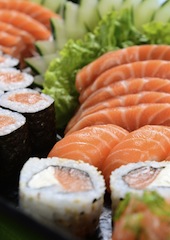Exporting Japanese Food Culture
Japanese cuisine has become a UNESCO world cultural heritage. What role can that play in reviving the economy?
December 12, 2013

Many books and articles have been written about the “American Dream.” But what about the “Japanese Dream?” Is there such a thing? If so, what does it look like?
Exploring that dream seems implausible to many people, since Japan still has not fully recovered from the doldrums of the past two decades.
After years of touting proposal after proposal on how to resuscitate the Japanese economy, many observers have given up hope. They believe that little — if anything — can be done.
That is certainly a discomforting prospect for the Japanese. Clearly, what Japan needs is a vision for its own future. Call it the “Japanese Dream.”
The old dream
After World War II, a typical success story in Japan was easy to define: First, graduate from Tokyo University — Japan’s most prominent national university. Then, work at the Ministry of Finance or at one of Japan’s big commercial banks.
Once you had been hired by a government ministry or a major bank, a rewarding career — and a happy retirement — were guaranteed.
This “Japanese dream” — which was enabled in part by a life-long employment system — is all but gone. Japan’s economic system, after experiencing high growth until the late 1980s, is under great pressure.
So what will save Japan? Some say the Japanese manufacturing sector, which is still alive and competitive. However, the manufacturing industry’s share of Japan’s entire GDP is just 18%. I don’t expect it to be the single engine that powers Japan’s growth.
Food as pop culture
So, what then could rekindle the Japanese dream? Let’s look to Japanese culture.
Japanese food is an excellent example. In the 1990s, the Japanese television show called “Iron Chef” began airing on The Food Network in the United States and achieved great popularity.
Its viewers started to learn that Japanese cuisine is more than just sushi, tempura and sukiyaki — although these also remain very popular dining choices in the United States. Other television shows featuring Japanese cuisine also spun off and became popular.
Japan’s own haute cuisine
I am convinced that our food market is among the most sophisticated in the world. However, Japanese entrepreneurs have not matched this by developing and marketing food products for international markets.
The Italians and the French excel at selling their cultures to the world. France’s famous culinary academies — “Le Cordon Bleu,” for example — attract many foreign students who want to study the preparation of gourmet French cuisine.
In fact, there is a Cordon Bleu School in Tokyo. Years ago, my wife took classes there — and we spent thousands of dollars to enhance her knowledge of French cuisine.
Japan should take a serious look at marketing its agricultural products to other nations as well. Japan’s long suffering agriculture industry — and the Japanese economy as a whole — may get a much-needed boost if it does.
Already, there are signs this trend is emerging. A decade or so ago, Japanese restaurant chains began rushing to open bars and restaurants in Hong Kong and started plans to expand to mainland China as well.
And at last — as I have long advocated — UNESCO has just added Japanese cuisine to its list of world cultural heritages, joining French cuisine in that honor.
Editor’s note: This feature was adapted from an essay published at The Globalist on February 4, 2002.
Takeaways
Japanese entrepreneurs have not been developing and marketing food products for international markets.
In the 1990s, the Japanese TV show “Iron Chef” achieved great popularity in the United States on The Food Network.
The French excel at selling their cultures to the world. France’s worldwide culinary academies attract many students.
UNESCO has just added Japanese cuisine to its world cultural heritages, joining French cuisine in that honor.
Exporting branded cuisine and agricultural products to the world could boost the whole Japanese economy.
